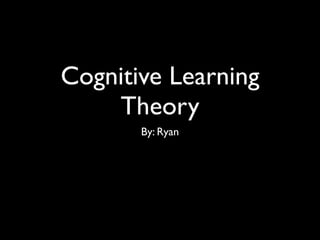
Powerpoint cognitive
- 1. Cognitive Learning Theory By: Ryan
- 2. What is Cognitive Learning? • “Cognitive learning is the result of listening, watching, or touching.” - thinkquest.org • It is also the learning through or experiences.
- 3. Allan Paivio • Discovered “Dual coding theory”- which states people process information in two different ways: processing of images, and processing of language.
- 4. Photo retrieved Robert Gagne from http:// www.distance- educator.com/ dnews/images/ gagne.gif • Gave 9 events of instruction. Which can better be understood with the diagram in the next slide. • Also explained their are 5 areas of learning outcomes. • 1. Verbal Information • 2. Intellectual Skills • 3. Cognitive Strategies • 4. Motor Skills • 5. Attitudes
- 5. Gagne’s Theory Photo retreived from http://www.nwlink.com/~donclark/ hrd/learning/gagne.gif
- 6. Charles Reigeluth • Created the Elaboration Theory • States that basic information should be Photo retrived from https:// info.educ.indiana.edu/ profile/DisplayImage.aspx? taught first to give support for more fileId=571 detailed information to come in later lessons. • According to Reigeluth this would maximize the students learning capacity.
- 7. Teachers using Cognitive Learning • Create lesson plans that start with basic information than continue with detailed lessons after. • Make each students goal obtainable. • Have lesson plans incorporate “hands-on” activities.
- 8. Students using Cognitive Learning • Students can read Electronic Books instead of traditional books to better visualize what is being read. • Play educational software games to visualize what is being learned.
- 9. Personal Use of Cognitive Learning • The cognitive theory of learning is something that I would personally use in a classroom, as I feel that it is important to understand and follow the ways that capitalize one’s individual learning. • Follow Bloom’s Taxonomy as it is a way to follow Cognitive Learning.